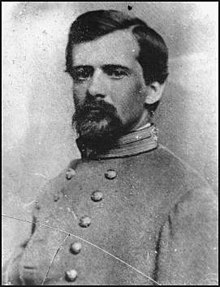John Pegram (general)
| John Pegram | |
|---|---|
 |
|
| Born |
January 24, 1832 Petersburg, Virginia |
| Died | February 6, 1865 (aged 33) Dinwiddie County, Virginia |
| Place of burial | Hollywood Cemetery Richmond, Virginia |
| Allegiance |
|
| Service/branch |
|
| Years of service | 1861–65 |
| Rank |
|
| Unit | 2nd U.S. Dragoons |
| Commands held |
20th Virginia Infantry Pegram's Cavalry Brigade Pegram's Cavalry Division Pegram's Brigade Early's Division |
| Battles/wars | |
| Spouse(s) | Hetty Cary |
John Pegram (January 24, 1832 – February 6, 1865) was a career soldier from Virginia who served as an officer in the United States Army and then as a brigadier general in the Confederate Army during the American Civil War. He became the first former U.S. Army officer to be captured in Confederate service in 1861 and was killed in action near the end of the war.
John Pegram was born in Petersburg, Virginia, the oldest son of third generation planter James West Pegram and Virginia Johnson Pegram. His grandfather and namesake, John Pegram, had been a major general, commanding all Virginia forces during the War of 1812. His father, James Pegram, was a prominent attorney, militia brigadier general, and bank president in Richmond. However, in October 1844, James Pegram was killed in a steamboat accident on the Ohio River, leaving a widow, who had to open a girls' school to support her five children. One of John Pegram's younger brothers was the future Confederate artillerist William Ransom Johnson Pegram. His great grandmother's half-brother was North Carolina senator Nathaniel Macon.
Pegram was appointed to the United States Military Academy in 1850. He graduated four years later, ranking tenth in his class, which also included future generals J.E.B. Stuart, Stephen D. Lee and Oliver O. Howard. Pegram was commissioned as a second lieutenant and assigned to the dragoons. He served at a variety of garrisons and outposts in the West. In January 1857, he was appointed Assistant Instructor of Cavalry at West Point. Pegram was granted a leave of absence in 1858–59 to travel to Europe to observe the Austro-Sardinian War. Returning home, he was assigned in 1860 to duty on the frontier in the New Mexico Territory.
...
Wikipedia
